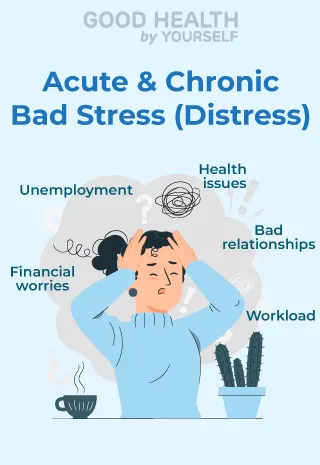Understanding Stress: Signs and Symptoms of Stress
Key Highlights
- Stress has become the unfortunate 'new normal' in today's times of uncertainty and technological overuse.
- While some amount of stress is helpful for the human system, long-drawn, severe, chronic stress leads to several physical and emotional problems.
- Financial troubles, heavy workload, abuse, discrimination, events like the pandemic are a few factors that cause mental stress.
- Mental stress is symptomized by various factors like headaches, sweating, mood swings, over-eating, depression, and aggression.
- Getting physically fit, eating right, indulging in self-care, and taking professional help when needed are some good ways to release stress.
Today, we live in times where 'stress is the new normal'. In earlier times, it used to be uncommon or rare for a person to feel stressed out. Life was usually slow-paced; family and community support were readily available; and competition-increasing factors such as social media had not made their appearance.
A person would feel stressed only if & when faced with some big, life-changing, negative event.
But now, with life becoming fast-paced and due to several other factors, mental aka psychological stress has become more common than ever.
So, it is important that we know about the signs & symptoms of stress, and also learn about ways to tackle stress.
Sample this:
- 49% of Nigerian population suffered from pandemic-related anxiety.
- Nigeria is termed the 'most depressed country' in Africa.
- As per 2022 statistics, Ghana has a rate of 4.20% people suffering from Depression.
- Suicide is the third leading cause of adolescent deaths in Thailand.
- Economic stress on families in Sri Lanka has made one in 10 children to lose their appetite and become more aggressive.
What is mental stress
So, what exactly is mental stress? In layman terms, it means any form of pressure that affects our brain and heart.
Now, this pressure can be of two types: good and bad.
Good mental stress is called 'eustress' and bad mental stress is called 'distress'.
A certain amount of good, low-grade stress is actually good for the human system. For instance, the pressure that one feels while sitting on a roller-coaster ride, or, while trying to finish preparing for an exam, or, while changing jobs is all the 'good type of mental stress' aka eustress.
Good stress
- Good stress causes a short-term burst in your hormones and gives several benefits.
- It not just helps in focusing the person's energy and motivate him/her to keep doing better, but it also improves resilience and increases the body's immunity to help fight infections and heal wounds faster.

Bad stress
- On the other hand, bad stress aka distress can lead to other crippling problems that may take a toll on a person's peace of mind and health.
- There are two types of bad stress: acute, and chronic.

Acute (bad) stress can leave you feel tired and jittery. However, the good part is that if controlled quickly, it does not cause lasting ill-effects.
On the other hand, chronic (bad) stress is something that is caused by factors that are too heavy for the brain and heart to handle, and as a result, the effects do not go away for a longer stretch of time.
This leads to complications like premature ageing, loss of sleep (insomnia), rapid or excessive weight gain, constant headaches, lack of concentration, anxiety, and depression.
On an even more serious note, long-lasting anxiety and depression can even lead to a person harboring suicidal thoughts.
Causes of mental stress
There are a wide range of factors that lead to mental stress amongst people. The 'stressors', as these factors are called, differ with changing times.
Factors that contribute to good stress include:
- Exercising
- Meeting a project deadline
- Preparing for an exam
- Changing jobs
- Changing place of residence
- Getting married
- Having a child
- Buying a new house
- Retirement
These stressors, while causing a temporary spike of tension in a person's mind, also go away once the goal is achieved.
In fact, they lead to happy results, which in itself boosts the person's physical and emotional health in several ways.
However, stressors that lead to bad stress (both, acute and chronic) are those that you should watch out for. These include:
- Financial worries
- Unemployment
- Long-term health problems
- Heavy workload
- Constant pressure to succeed
- Bad relationships
- Bad marriage
- Not being able to have a child
- Death of a loved one
- Experiencing discrimination
- Experiencing violence
- Experiencing sexual abuse, rape
- Being bullied
- War, riots, crime
- Being a victim of natural disasters like earthquakes or floods
- Becoming homeless
In recent times, the Covid-19 pandemic and its after-effects have turned out to be major stressors for people around the world. Lockdown, quarantine, social isolation, and the lack of normal human interaction that came with it, proved to be very stressful for thousands of people.
For instance, in Nigeria, the Covid-19 pandemic and lockdown showed severe negative effects on the mental health of people, with 21.6% male and 29.3% female Nigerians suffering from severe Post-Traumatic Stress Symptoms (PTSS).
Even in Ghana, where pre-pandemic levels of general feeling of well-being stood at 63.5%, the situation changed to show increasing number of Ghanaians feeling bored and anxious due to uncertainty and social isolation.
Apart from the pandemic, the socio-economic situation too is causing immense mental stress to Nigerians. Inflation, rise in cost of necessities like fuel, increased aggression, and even daily problems like worsening traffic have led to almost 80% of the population to be suffering from anxiety or depression to some or the other degree.
Symptoms of mental stress
More often than not, a delay in identifying the presence of mental stress leads to a person becoming chronic anxious, depressive, or even suicidal. Hence, it is pertinent to identify symptoms of stress if they start showing up prominently.
Physical symptoms of stress include:
- Pinpoint pains
- Headaches
- Twitching of muscles
- Sweating
- Cramping
- Feeling tired constantly
- Unexplained stomach spasms
Emotional stress symptoms include:
- Feeling angry or irritable for no reason
- Mood swings
- Feeling sad without reason
- Nail biting
- Not being able to concentrate
Stress can also show up in behavioral changes such as:
- Getting socially withdrawn
- Consuming tobacco/alcohol excessively
- Having angry/violent outbursts
- Crying constantly
- Eating too little or too much
Chronic stress symptoms include:
- Insomnia/difficulty in sleeping
- Anxiety
- Depression
- Falling sick often due to lowered immunity
- Blood pressure and heart problems
- Constant aches and pains
- Loss of sexual desire
How to live a stress-free life
The best way to stop mental stress from having long-term effects on your health is to recognize the symptoms early and take firm steps to eliminate the root of stress.
Stress-related health problems such as diabetes, obesity, Alzheimer's disease, cardiovascular problems etc., are constantly on the rise.
Hence, the faster you work towards managing your mental stress, the easier it'll be to prevent stress from becoming chronic.
Helpful ways to combat stress


Become physically active:
- Take up outdoor activities like walking your pet, cycling, brisk walking, or jogging. The combination of oxygen-rich air and physical exercise can work wonders to reduce stress.
- Swimming is also known to be a great mood-lifter, as well as, helpful for improving concentration and sleep patterns.
Disconnect from technology:
- While computers and smartphones are a great way to interact with people across the world, being constantly connected via technology and social media can lead to severe increase in anxiety, and pressure to look and behave in certain ways.
- Using phones and computers at odd hours can also disrupt sleeping patterns, thus making you feel tired and unable to prioritize your life.
- Opt for a digital detox at certain intervals. Go out and socialize with people instead of just being connected via technology. Bonding with people over similar interests can help release your tension and stress.
Learn to say 'No':
- In times where we all want to put up a perfect, multitalented image of oneself, it gets very difficult to say 'No'. That leads to mismanagement of our time and health, which only adds to stress.
- Learn to identify what you really want to do. Realize that you cannot do it all, and that it is okay to say 'no' to some things. It will help you manage your time such that you'll not feel pressured and anxious.
Indulge in self-care:
- We often tend to put others before ourselves; forgetting that we can make others happy only if we are happy from within.
- Take time off to relax and rejuvenate. Do something that makes you truly happy. Pursue a hobby, practice yoga, visit a spa, dance, play with animals, or just sleep doing nothing!
- Writing down your thoughts, meditating, colouring, laughing out loud are also good ways to release pent-up stress.
Have a healthy diet:
- Nutritious food is very beneficial in improving resilience to stress.
- Foods laden with sugars, caffeine, and bad fats such as chips, cakes, and alcohol may give temporary relief, but their consumption can only lead to increased stress and low immunity in the long run.
Seek help:
- If at any point you feel that your stress is becoming unmanageable, do seek professional help.
- Remember, there's absolutely no shame in visiting a counsellor or psychiatrist if you feel constantly anxious, depressed, or suicidal.
Conclusion
Mental stress is bad for a person's physical and emotional health. Illnesses caused by stress and anxiety are increasing more than ever before.
Apart from physical problems like diabetes and heart disease, stress also leads to emotional complications like anxiety, depression, paranoia, PTSD, and suicidal thoughts. It also lowers the body's immunity, thus making it easy catch infections and difficult to heal wounds.
Thus, it is important to recognize the signs & symptoms of stress early on, and take steps towards releasing the stress as soon as possible in order to lead a long, healthy life.
Did you like our Article?
Excited
0
Happy
1
Not Sure
0
Silly
0
- Stress Management: How to Tell the Difference Between Good and Bad Stress
- Psychological distress experiences of Nigerians during Covid-19 pandemic; the gender difference:
- Does prolonged stress enhance coping? Nigerian healthcare providers and COVID-19-related stress management: Pats journal
- Prevalence and changes in boredom, anxiety, and well-being among Ghanaians during the COVID-19 pandemic: a population-based study: PMC Public Health
- Stress, major causes of illnesses in Nigeria: Vanguard
- Why stress happens and how to manage it: Medical News Today
- Stress management: Mayo Clinic
- Sri Lanka: One in three families see changes in children's mental health amid economic crisis: Relief Web
Our team of experts frequently monitors developments in the health and wellness field, and we update our articles when new information becomes available.
Current Version
Aug, 01 2023
Written By
Blessing Ifunanya Maduelosi

Leave a Comment